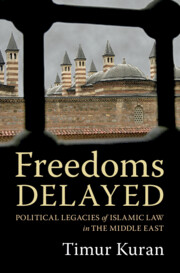Book contents
- Freedoms Delayed
- Freedoms Delayed
- Copyright page
- Dedication
- Contents
- Figures
- Tables
- Preface
- Part I The Modern Middle East’s Authoritarian Face
- Part II Persistent Social Atomization
- Part III Religious Repression
- Part IV Economic Hindrances
- Part V Conclusion
- 15 Islamic Institutions and Muslim Freedoms
- Notes
- Bibliography
- Index
15 - Islamic Institutions and Muslim Freedoms
from Part V - Conclusion
Published online by Cambridge University Press: 20 July 2023
- Freedoms Delayed
- Freedoms Delayed
- Copyright page
- Dedication
- Contents
- Figures
- Tables
- Preface
- Part I The Modern Middle East’s Authoritarian Face
- Part II Persistent Social Atomization
- Part III Religious Repression
- Part IV Economic Hindrances
- Part V Conclusion
- 15 Islamic Institutions and Muslim Freedoms
- Notes
- Bibliography
- Index
Summary
Islam’s historical institutional complex has delayed a liberal order in the Middle East, not blocked it permanently. The institutions primarily responsible for the region’s historical trajectory are either gone or, under new conditions, they no longer inhibit liberalization. The infrastructure for an effective civil society is in place. Apart from private associations, it includes perpetual enterprises. And no absolute barrier exists to reinterpreting illiberal readings of Islam. By and large, the institutions that sustain the region’s repressive regimes are mutually supporting. For example, religious illiberalism facilitates associational repression, and vice versa. In any one context, the interlinkages among various institutions may work against liberalization, because change depends on appropriate movements in complementary institutions. The half-full part of this glass is that altering a single institution can destabilize others, possibly unleashing a cascade of mutually reinforcing reforms. Yet there is probably no quick fix to the prevailing illiberalism. Many patterns must change for the Middle East to reach advanced standards of liberty. Although specific changes can stimulate one another, each involves adjustments to interpersonal norms, organizational rules, and state laws. Some would upset longstanding status rankings and hierarchies. Learning civic skills requires communal practice. Vested interests are already organized.
Keywords
- Type
- Chapter
- Information
- Freedoms DelayedPolitical Legacies of Islamic Law in the Middle East, pp. 269 - 286Publisher: Cambridge University PressPrint publication year: 2023

